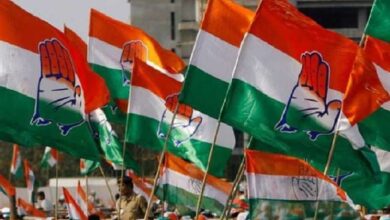virtual currency bubble

[ad_1]
The most important reason behind calling virtual currency the epidemic of modern times is that these currencies are virtual, out of government control and their prices climb very dangerously.
Sanjay Verma
The most important reason behind calling virtual currency the epidemic of modern times is that these currencies are virtual, out of government control and their prices climb very dangerously.
In the Corona era, the virtual rules and regulations that have been talked about loudly, in one of the centers of that discussion is also a digital ie cryptocurrency like bitcoin called virtual currency. These days virtual currency (cryptocurrency) is being advocated for investment all over the world. Today there are hundreds of virtual currencies, including bitcoin, that are outside the purview of the regulation of central banks in many countries.
Apart from El Salvador, no other country in the world has given bitcoin an official transactional status. But the way in which there is a competition to buy and sell these currencies as a new investment option around the world, the ears of economists and governments have stood up. In India too, the central government has made preparations to take a big decision on this issue. The central government is expected to introduce a comprehensive bill on regulation of virtual currency in the winter session of the Lok Sabha.
Recently, a parliamentary committee headed by former minister of state for finance Jayant Sinha discussed the pros and cons of virtual currency, emphasizing on regulating it rather than banning it. However, the very next day of this meeting, Reserve Bank of India Governor Shaktikanta Das expressed his concerns about the future of the virtual currency and said that he would step up on the issue.
India is not the only country where the volatility and circulation of virtual currency has become a cause for concern. Recently, Indonesia’s National Ulema Council (MUI) has declared virtual currency ‘haram’. The council said that since the character of virtual currency includes elements such as uncertainty, pitfalls and gambling, it is haram.
China also banned the creation and transaction of bitcoin and other virtual currencies in September this year. China’s central bank, the People’s Bank of China, said that such virtual currencies pose a serious threat to the security of public deposits. Significantly, China is one of the largest virtual currency markets in the world. The volatility in the virtual currency there has often affected the global prices of these currencies. So when China banned bitcoin in September, its value fell by more than two thousand dollars on that day. However, due to no firm regulation in other parts of the world, transactions of virtual currencies such as bitcoin remained unchanged and their prices rose again.
Today the condition has become that people are investing heavily in virtual currencies to become rich overnight. Especially in the young population, a kind of madness is being seen about it. This is because in some cases virtual currencies have proved to give huge returns without any reason. Like the price of the most popular virtual currency bitcoin has reached from a few dollars in a few years to now sixty five and a half thousand US dollars (about ninety nine lakh rupees).
Hundreds of virtual currencies like Dogecoin, Ripple, Ethereum, Litecoin, Dash, among many others, have been successful in attracting people just for investment. But the biggest concern of governments, central banks and sociologists now is that the virtual currency sensation may not prove to be like the dotcom bubble of 2000, when people saw the increase in business of computer and IT companies around the year 2000. The capital was thrown away and later most of them became poor.
The most important reason behind calling virtual currency the epidemic of modern times is that these currencies are virtual, out of government control and their prices climb very dangerously. However, one of the biggest strengths of bitcoin is its limited number of printings, overtaking virtual currencies that strike a delicate balance of demand and supply.
Due to its fixed model and strict rules of circulation, only 20 million bitcoins exist in the world. It is attractive to investors because after being virtual, it gives a sense of ownership to the buyer and the risk of its theft is minimal. But the bitcoin scam that recently emerged from Karnataka also exposed the threat of breaching virtual currency websites. The way Srikrishna alias Sriki broke into the bitcoin exchange in Karnataka and deposited crores of bitcoins in his account, the danger of destroying the capital of its buyers has become clear at any time.
One of the arguments that investors have been tempted to claim to turn to virtual currency is to suggest bitcoin etc. as an attractive investment option like digital gold. But keep in mind that investment in anything outside government currencies is determined by its fundamental value. The principal value is the amount on the basis of which an asset is expected to arise. For example, if an investor invests in a company, then he does so in the hope that the company will earn profit in the future.
This will put the investor in a position to take advantage of the increased stock and dividend in the form of dividends. Similarly, currencies of central banks are considered to be easy means of transactions within a specified system because the government promises to pay an amount equal to the price printed on that currency. But in the case of virtual currency there are no assurances like investing in gold or shares and government currencies. There is no basis for determining the original price or the property to be given in lieu of it.
The attraction for investing in virtual currency also remains because there is an option to redeem them in any corner of the world outside the government system. The supply and reserves of virtual currency are also linked by the logic of being limited like gold. This logic behind the increase in their prices has also been seen to be working to some extent, but when compared with gold, you will find that gold has a physical existence, while the existence of bitcoin etc. is purely virtual. Which is why it doesn’t take long for virtual currency prices to crash even with a tweet from billionaires like Elon Musk or news of sanctions from big governments.
If the point is to make a simple computerized currency for transactions at par with the prevailing government currencies, it should be attempted by the governments themselves. Governments should create their own virtual currency. An idea of this in the form of Laxmikine has also come up a few years back. Whether it is digital currency or virtual currency, giving the public an option of easy payment from mobile-internet can be a good initiative.
Whatever the challenges of securing the transactions of these currencies and keeping the money of the general public in them, new ways have to be found to overcome them, because they are the currencies of the changing times. The future is theirs, it is good that from now on, arrangements should be made to take care of them carefully.
,
[ad_2]






